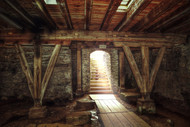Wine Cellar Cooling & Construction
Posted by Devon Chandler on 23rd Jan 2023
Time and time again, wine cellar builders are confronted with a question from those just knowledgeable enough to be dangerous to themselves: "What cooling unit should I buy?
This is a much larger question than most are prepared for - and for one simple (and unfortunate) reason:
That question should have been asked during construction.
Wine cellar cooling units are great at their jobs. They keep insulated, temperature-stable areas cool and/or humid. There are some decidedly key words in the preceding sentence. Can you guess what they are?
Rooms that are poorly constructed for cellaring wine are not good candidates for cooling units. The easiest analogy to make is that of a refrigerator. If you want your food to stay cold, you keep the doors shut. Poor insulation, unsealed environments (especially shower-style glass with gaps all around), and fluctuating temperature are all challenges that most commercial cooling units don't respond to well - in essence, things that keep the fridge door open. If your environment is not well-treated prior to installation, you are setting yourself up for a lifetime of warranty disputes, unnecessarily high power bills and early wear due to constant unit operation, underwhelming performance, and overall headache.
If you haven't built the room which will become your cellar to industry standards (vapor barriers, sealed and double-paned glass, insulation with an absolute minimum R-value of 13), you have three options:
1) Retrofit the room to industry standards before cellaring any prized bottles.
2) Install a cooling unit anyway (and regret it).
3) Forego the cooling unit.
To be quite honest, nine times out of ten, I am going to be a proponent of option number three. If you are incredibly serious about cellaring your wine under perfect conditions for long periods of time, then you will want option number one. Please, please never choose option number two.
There is a reason wine cellars are just that: cellars. Cellars exist underground, with literal tons of cool, damp earth to protect a collection from the elements. Places similar to a classic cellar will pose the least amount of obstacles for you to overcome. In short, basements are a good choice. Attics, sun rooms, anything next to a thin exterior wall in the American Southwest... Not so much.

